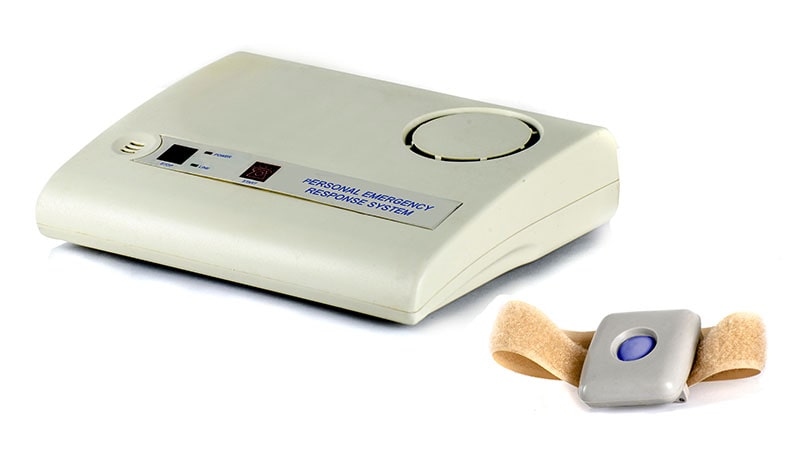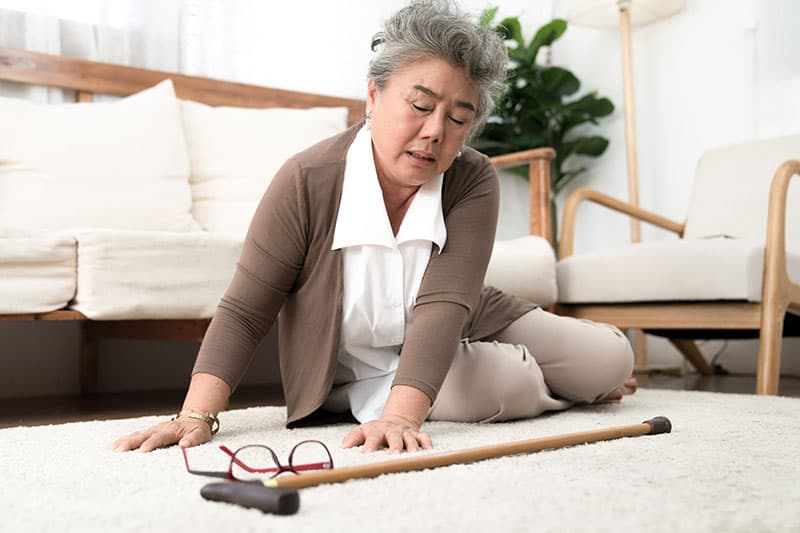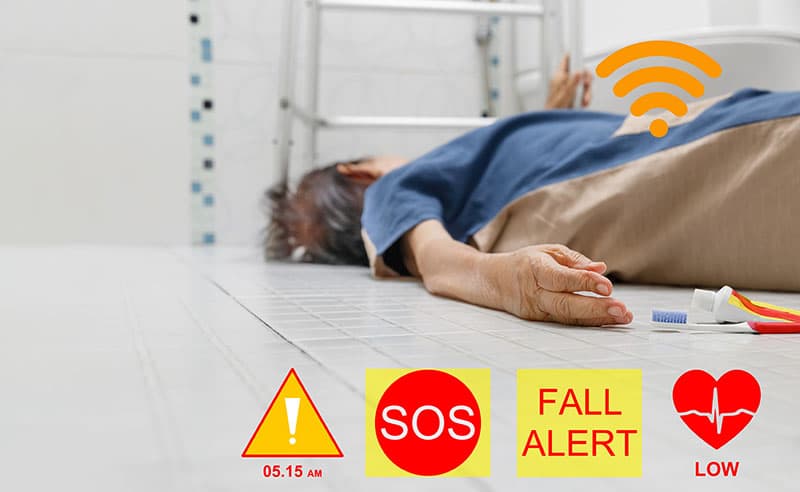
Are you a senior living alone? Do you fear for your safety in case of a health emergency or accident because you have nobody around to help?
You can stop worrying. Innovative and reliable medical alert systems with fall detectors are available for seniors in Manitoba. These wearable devices have a panic button that connects instantly to qualified emergency response centers for all types of emergencies.
As long as you wear your panic button, you can easily press the help button and a trained emergency operator will assist you by calling for an ambulance, the police, or notifying your listed contact.
Statistics show that about 20% of seniors in Canada fall every year, leading to injuries, hospitalization, long-term care, and even death. Family members worry about seniors being alone in case of a fall or medical emergency.
With a reliable medical alert system with fall detection, seniors can continue to live independently without fear for their safety. The device is very easy to use and costs so little compared to the peace of mind and self-confidence you can get!
Compare multiple quotes for the best fall detector for seniors in Manitoba. Just fill out the short online form on this page, free of charge!
Why do seniors in Manitoba need emergency alert systems?

In a recent study by the National Institute of Aging, Canadians 65 and older said that they preferred to live in their own home as long as possible rather than in an assisted living or nursing home.
This is easy to understand because no other place can be more comfortable than your own home. But for many seniors, living alone can be very risky and difficult.
Fortunately, emergency alert systems for seniors mitigate the risks by allowing easy and quick access to emergency services 24/7 at a minimum cost. This kind of security gives peace of mind to seniors and their family members, too.
Emergency alert systems are also called personal emergency response systems (PERS) or medical alert systems. They are highly recommended for:
- Seniors 65 and older;
- Seniors living alone or spend a long time at home without company;
- Older adults with a history of falls;
- Older adults taking medications with side effects;
- Individuals recovering from surgery or illness;
- Seniors with balance or mobility issues;
- Individuals with medical conditions such as asthma, stroke, cardiac problems, hypertension, etc.;
- Seniors with dementia or Alzheimer’s;
- Individuals living with a disability.
Medical alert systems today have sophisticated software for GPS tracking, geo-fencing, data monitoring (health management), and activity monitoring.
These systems have panic buttons that can be pressed to get connected to emergency monitoring centers for assistance. With 2-way voice communication systems, the user can speak to an operator without using a phone and receive medical assistance fast.
Lastly, you should know that using a medical alert system is not just about old age but rather for being prepared in case of an emergency. A medical alert system saves lives!
Types of medical alert systems and how they operate

Not all medical alert systems are the same. Each of them has features that aim to offer protection to seniors on different levels. They also have different prices.
Medical alert systems are generally classified into two broad types – in-home use and on-the-go.
In-home systems have a console and a wearable bracelet or pendant. The user can use both to call for help and speak to an operator from a monitoring center. The most important factor to consider is the range of the system. The system you choose must have a range that is suitable to the size of your home to ensure you have protection from all areas of your house.
Depending on the company you choose, an in-home medical alert system can be connected to a landline or a cellular network.
Most home medical alert systems offer a range of 200 to 600 ft.
On-the-go systems can be used in the home and outside the home. It is more suitable for seniors with an active lifestyle or at least those who tend to go outside the home, even if occasionally.
On-the-go systems work on cellular networks. No matter where you go, you can always count on your panic button bracelet or pendant to provide you with access to emergency services.
Mobile systems also offer additional features such as GPS tracking, geofencing, and automatic fall detection.
These added layers of protection are ideal for seniors who suffer from dementia, Alzheimer’s, memory loss, cognitive issues, balance or gait problems, and other medical conditions that put them at high risk.
On-the-go systems are a bit more expensive than in-home systems.
Medical alert systems with fall detection technology

Some medical alert systems are equipped with fall detection technology.
Fall detection technology uses built-in sensors called accelerometers that identify a possible fall based on height, speed, orientation, etc. These sensors gather data to evaluate if the movement is normal (sitting down, lying down, standing up), or falling.
Manual systems (standard medical alert systems) need the user to push the help button after a fall to ask for emergency assistance. If your device has automatic fall detection, the monitoring center will receive an alert if you fall and don’t press the button. This can happen if a user is unconscious or cannot move after falling.
As you can see, fall detection is essential to protect seniors and individuals with a history of falls.
It is important to note that for other emergencies (not fall-related), the user must press the panic button to call for help.
For this reason, seniors must wear their emergency bracelets or pendants at all times, including while in bed or in the bathroom.
Medical alert systems allow seniors to live independently without causing their family members to worry so much. These devices are also ideal for people living with disabilities or those who worry about not having someone during an emergency.
Find a medical alert system that suits your needs and budget using our short online form!
What can’t a fall detector do?
Fall detection technology is far from perfect. Most fall detectors can detect only rapid falls. Some falls may not register, such as if you slide from a couch or bed. Thus, it is still recommended for a user to press the panic button in case of a fall.
Some fall detectors are more advanced than others. For instance, some medical alert systems claim up to 93% accuracy in fall detection. It is critical to compare the different fall detectors on the market.
Using a fall detector will probably not prevent you from falling but you will definitely not be left helpless for days. Getting help fast in an emergency is what fall detection devices are all about.
Medical alert systems based on monitoring

Another way that medical alert systems are classified is to whom the device connects when a user has an emergency.
Some systems offer professional monitoring services which means users are connected to a 24/7 monitoring center when they press the panic button.
Professionally-monitored medical alert systems have monthly fees. The cost of your subscription depends on the type of system you have. Some companies require a locked-in contract while others offer a month-to-month subscription which can be canceled at any time.
There are medical alert systems that dial up to 10 pre-established numbers when a user presses the help button. For these systems, the user can get connected to family members, caregivers, or even 911. Systems such as these have no monthly fees but their reliability is also not as high as professionally-monitored systems.
Why choose professionally-monitored medical alert systems?

Professional monitoring stations operate 24/7 – they never go on holiday. This means that any time that a user calls for help, someone is sure to be on the other end of the line within seconds.
Systems that connect to a family member or caregiver take longer to get a response because the person may be unavailable or busy. With this type of system, the contact person must be the one to coordinate with 911, medical responders, or the police. If the response from the contact person is delayed, help is also delayed.
Can you just rely on a smartphone to call for help? While smartphones are convenient for communication, it is faster and easier to just press a panic button in an emergency. There are times when you don’t have a smartphone within easy reach such as when you are taking a bath. If a senior is injured or disoriented after a fall, it may be difficult to move or remember numbers to dial.
When it is a matter of life or death, the speed of response is critical. This is why a monitored medical alert system is the most convenient and secure way to reach emergency services.
How monitored medical alert systems work
If you have a monitored device, you only need to press the help button and a person will speak to you through your wearable device or base unit. You can tell them what’s wrong and the necessary assistance – ambulance, police, or fire department- will be dispatched. If they need to contact a family member in a personal emergency, they will do so.
The monitoring center also has your personal information such as your address and medical history. They can also have a spare key in a lockbox if you allow it. In case you don’t feel well enough to speak, they will have what they need to coordinate the proper emergency response.
For GPS-enabled devices, the monitoring center can quickly locate the user so that no time is wasted in sending emergency services.
Some monitoring services offer coverage for spouses if you get an additional panic button at a small fee. You can also get medication alerts and other perks.
You can get more peace of mind that help is always just a press of a button away.
What’s the price of a medical alert system in Manitoba?
Now that you know the benefits of a medical alert system for seniors and the different types of systems available, your next step is to choose the right price.
Below you will find some of the best medical alert systems in Manitoba, their features, and prices so you can find the right system for you.
Galaxy Medical Alert Systems
Galaxy Medical Alert System’ headquarters is located in Windsor, Ontario but its products and services are available across Canada.
Their emergency operators are trained professionals in the medical industry. Their monitoring centers operate under the highest industry standards with certifications from TMA, ULC, UL, and CSAA.
Galaxy offers their In-Home system (Landline) and In-Home with Fall detection, In-Home Cellular, and On-The-Go with Mobile watch with GPS and Mobile watch with GPS and Fall Detection.
The In-Home System starts at $29.95/month while the Home System with Fall Detection costs $39.95/month.
The Home Cellular with Fall Detection costs $49.95/month. The On-the-Go systems starts at $44.95/month.
Their systems also have sensors to measure heart rate, motion, step counting, and vibration.
Victoria Lifeline Medical Alert Systems
This company advocates safe independent living for seniors with the help of advanced medical alert systems. Their plans include HomeSafe (Standard), HomeSafe with AutoAlert Fall Detection, and GoSafe Mobile System.
It is part of Victoria Hospital Foundation which has reinvested its profits into improving the healthcare system in the province.
The company offers home installation and free ongoing support services. They can also send a professional to your home to assess your needs and your living conditions to offer the right system for you.
The company also offers subsidized rates for HomeSafe at $21/month for qualified seniors.
The company does not require a long-term contract and no expensive cost for equipment.
Victoria Lifeline is available in over 350 communities in Manitoba.
Global Security Medical Alert Systems
Global Security is a top provider of ADT security systems in the country. Its latest offering, top-notch medical alert systems, use advanced fall detection technology and a healthcare platform called EverThere.
Everthere allows caregivers of family members, with the consent of the user, to access the senior’s medical data for heath management.
Monitoring services start at $34.99 with an equipment cost of $379.99 and a one-time activation fee of $99. The company requires a 36-month contract for their monitoring services.
Global Security claims to have the most advanced fall detection system with 93% accuracy. Their devices come in the form of a waterproof pendant or bracelet
SecurMedic
This is a Canadian company located in Vancouver, B.C. with 6 interconnected monitoring centres that are certified by the Underwriters Laboratories of Canada (ULC).
Their systems are available in watches or pendants with a panic button that can be pressed to call for help for medical or other types of emergencies.
100% waterproof with a range of 1000 ft., their devices offer total protection and can also be used to answer calls.
Note that their systems are manual and don’t offer fall detection. Users need to press the help button in any emergency.
Their standard plan starts at $24.88 a month and the equipment costs around $188.88.
Life Assure
Life Assure is a leading provider of medical alert devices for the elderly in Canada. The company aims to keep seniors safe while allowing them to remain independent. They use state-of-the-art technology for the medical alert devices.
Located in Winnipeg, many seniors in Manitoba definitely trust Life Assure for their protection.
The Life Assure Classic Home costs $29.95 a month. Life Assure Total Home costs $44.95 a month, while the Life Assure Premium Mobile Plus costs $69.95 per month.
You can choose quarterly or annual payment plans to save on your subscription costs.
How do you choose the best system and plan for you? The most important factor to consider is your needs. If you have a history or a fear of falling, you can choose a fall detection system for your peace of mind. If you lead an active lifestyle, a mobile medical alert system with GPS and fall detection would be a good choice.
Compare offers from reliable medical alert systems by filling up the form on this page and receive free and no-obligation quotes today!
Our partners serve Winnipeg and all Manitoba communities for your medical alert needs!


